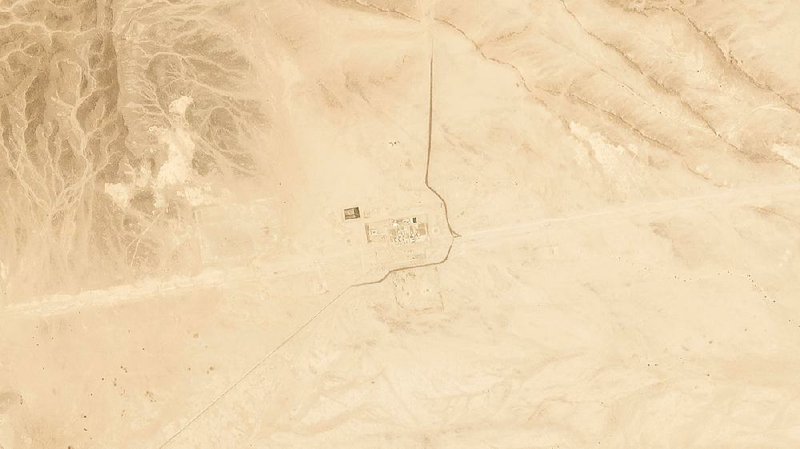BEIRUT -- The State Department has ordered all "non-emergency U.S. government employees" to leave Iraq as tensions increased with Iran, which backs proxy forces there.
In a statement Wednesday, the department said the announcement affects both the U.S. Embassy in the capital, Baghdad, and a consulate in the northern city of Irbil.
"Normal visa services at both posts will be temporarily suspended," the department said. "The U.S. government has limited ability to provide emergency services to U.S. citizens in Iraq."
President Donald Trump's administration has accused Iran of supporting "imminent attacks" on U.S. personnel in the region and has taken an increasingly aggressive stance against Tehran.
Officials have spotlighted recent U.S. decisions to deploy an aircraft carrier, strategic bombers and other military assets to reinforce troops across the Middle East. They have also told reporters that further military action is on the table.
But allies have expressed caution in public and alarm in private, challenging U.S. claims of a rising threat level, and, at times, raising concerns that the diplomatic spat is being politicized by the Trump administration.
European Union foreign-policy chief Federica Mogherini said Monday that Europe wanted to avoid "escalation on the military side" after Secretary of State Mike Pompeo stopped in Brussels during a summit of EU foreign ministers there in an attempt to bring them on board. Playing off Pompeo's comments regarding "maximum pressure," Mogherini called instead for "maximum restraint."
Pompeo asked the diplomats from Britain, France and Germany, all of which were parties to the 2015 nuclear agreement with Iran, to convey a message to Tehran, senior State Department officials said Wednesday.
"We asked them to use their influence with the Iranian regime to explain that they need to de-escalate," an official said. "That's the message. That was the request."
The official is one of three who briefed reporters anonymously on the condition of anonymity to discuss closely held intelligence. They described the decision to draw down the embassy staff as a common-sense precaution, not a rush to war.
"It would be an act of gross negligence if we did not take the necessary precautions in the light of credible threat streams," one official said. "That does not mean we are rushing to a conflict."
The decision to order all unessential personnel to leave the U.S. Embassy in Baghdad was prompted by intelligence over the past week suggesting that an attack on Americans by Iranian-backed militias was imminent, the officials said.
"This is an imminent threat to our personnel," said one official. "This threat stream, let me tell you, is real," he added, comparing it to the situation in 2011 in Iraq when U.S. installations were under direct attack.
The officials said intelligence about the behavior of Iraqi militias directly linked to Iran had been amassing over more than a week, suggesting that the militias had started making preparations for an attack on Americans. Though the specific target and dates were not known, the officials said the trajectory was clear.
"We know the groups, we know who the groups talk to," the official said. "It isn't Tibetans giving these guys orders."
In a statement Wednesday, Iraq's Foreign Ministry described the security situation as "stable" and urged dialogue between all parties.
"Iraq is a country that respects its partners and friends [and] shares common interests with them," it said.
CONGRESSIONAL QUESTIONS
Lawmakers from both parties on Wednesday demanded more information on the White House's claims of rising threats in the Middle East.
The top leaders in Congress are to receive a classified briefing from the administration today. But House Speaker Nancy Pelosi said the White House has resisted a wider presentation for all lawmakers, part of what Democrats say is a pattern of stonewalling. Some Republicans, including Utah Sen. Mitt Romney, sought out their own briefings.
Pelosi said Trump has "no business" moving toward a Middle East confrontation without approval from Congress.
"We have to avoid any war with Iran," she told fellow Democrats in a meeting, according to a person in the room who spoke on condition of anonymity to discuss comments from the private gathering.
"Congress has not authorized war with Iran, and the administration, if it were contemplating military action with Iran, must come to Congress to seek approval," said Sen. Bob Menendez of New Jersey, the top Democrat on the Senate Foreign Relations Committee. He said he had never seen anything like the "non-answers" coming from the administration.
Republicans -- and even some Democrats -- who have been briefed said the threats are legitimate.
The chairman of Foreign Relations Committee, Sen. Jim Risch of Idaho, said that based on the information he received he supports the administration actions, including the repositioning of the USS Abraham Lincoln aircraft carrier to the Persian Gulf.
"The threat is real," said Democrat Sen. Mark Warner of Virginia, the ranking member of the Senate Intelligence Committee. But, he said, "The administration is doing a dreadful job of consulting with Congress and keeping the vast majority of members of Congress informed about what's happening."
And Republican Sen. Marco Rubio of Florida said the information he's seen shows "by far the single most imminent potential conflict of this significance" in his eight years in Congress. "The intelligence is unmistakable and clear, and it's backed by observable movement on the ground," he said.
Still, Romney expressed support for the Senate Democrats' request for more information in a classified briefing, and Risch said a broader briefing for senators, perhaps next week, was "in the works."
Romney said it's "inconceivable" that Trump would start a conflict with Iran. "There's no appetite for going to war in the Middle East," he told reporters.
On Wednesday afternoon, Rep. Seth Moulton, D-Mass., a Marine veteran who served in Iraq, introduced legislation to require the Trump administration to have congressional approval before "engaging in hostilities" with Iran. In April, Sen. Rand Paul, R-Ky., pressed Pompeo during a hearing for the same commitment, but the secretary of state deflected the request.
'PSYCHOLOGICAL WARFARE'
Iran has long supported a network of proxy forces across the Middle East, backing militias in Iraq, Lebanon, Syria and Yemen as part of a broader struggle for influence. Trump campaigned on a platform of rolling back that influence, and his national security adviser, John Bolton, is a longtime advocate of boxing Tehran into a corner.
Iran has described growing pressure from the Trump administration as "psychological warfare" aimed at regime change. Iran's supreme leader, Ayatollah Ali Khamenei, used his Twitter account Tuesday to warn against further escalation.
"We don't seek a war, nor do they," he said. "They know a war wouldn't be beneficial for them."
As tensions rose this week, several U.S. allies appeared to distance themselves from U.S. missions in the region. On Tuesday, Spain announced that it had pulled a frigate from a U.S.-led naval group that is headed for the Persian Gulf.
On Wednesday, Germany and the Netherlands said they had suspended participation in a training mission for Iraqi troops. Norbert Rottgen, chairman of the foreign affairs committee in the Bundestag, the German parliament, said the German decision to temporarily suspend its training mission was based on a U.S. tip of a specific security threat in Iraq. But he said he did not believe it was directly related to broader U.S. concerns about Iranian military action.
He cautioned that escalation is a dangerous game. "Accidents happen. Misinterpretation of behavior happens," Rottgen said. "If there is conflict, it would not be by intention, but by accident."
Separately, Saudi Arabia restarted its main cross-country oil pipeline after a drone attack by Iran-backed rebels halted the link, escalating tensions in the world's largest oil-exporting region.
State-run oil company Saudi Aramco resumed operations at the pipeline after a brief halt Tuesday, according to a person with knowledge of the situation. A drone attack claimed by Houthi rebels in neighboring Yemen on Tuesday had targeted two pumping stations along the link, which crisscrosses the Arabian peninsula, carrying crude, natural gas and refined products.
Saudi Aramco officials had no immediate comment when asked Wednesday, and the country's energy ministry declined to comment.
The risks of conflict in a region that exports more than 16 million barrels of oil a day -- enough to supply all of Europe's demand and more -- have risen since the U.S. revoked waivers this month that allowed Iran to continue selling oil to some customers despite American sanctions. Saudi Arabia and the United Arab Emirates -- Iran's regional foes -- reported on Monday attacks on several vessels including Saudi oil tankers. Houthi rebels on Tuesday claimed they had used drones to damage Saudi oil-pumping stations.
Information for this article was contributed by Louisa Loveluck, Michael Birnbaum, Griff Witte, Carol Morello, Rick Noack and Mustafa Salim of The Washington Post; by Edward Wong of The New York Times; by Lisa Mascaro, Susannah George, Mary Clare Jalonick, Matthew Lee, Padmananda Rama, Laurie Kellman and Zeke J. Miller of The Associated Press; and by Nayla Razzouk and Anthony DiPaola of Bloomberg News.
A Section on 05/16/2019


